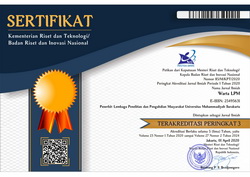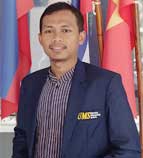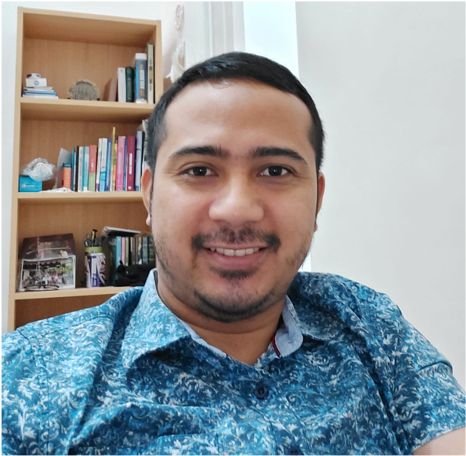Based Learning Training Lesson Study to Improve the Quality of Elementary School Teachers Kartasura Muhammadiyah, Indonesia
DOI:
https://doi.org/10.23917/warta.v25i1.592Keywords:
training, learning, based, lesson studyAbstract
Aim of study is to examine and describe 1) the effectiveness of lesson study as a model of Muhammadiyah Elementary School teacher training to improve the quality of learning 2) validation of lesson study as a model of Muhammadiyah elementary school teacher training to improve the quality of learning. This research used an approach of descriptive-qualitative phenomenology and the research design used the modified class action-based lesson study. The subject of study included the Primary School teachers Muhammadiyah of Kartasura, and the informants were the teachers, headmasters, supervisor. The data gathering employed questionnaires, interview, and observation The data analysis used the first order understanding and second order understanding with an interactive model, including data reduction, data display, and conclusion/verification. The conclusion of this research is, 1) The effectiveness of lesson study as a model of coaching Muhammadiyah elementary school teachers to improve its the quality of learning through K3S (Principal Working Group), while its implementation through KKG (Teacher Working Group) activities. 2) validation lesson study as a model of teacher development to improve its quality of learning through validation on a limited scale programmed by the KKG (Teacher Working Group) at the cluster level in each school, and carried out evaluation, and validation of this lesson study to create active, innovative, creative and fun learning.
Downloads
References
Blaikie, P. M., & Brookfield, H. (1987). Land degradation and society London: London : Methuen.
Carpenter, S., Walker, B., Anderies, J. M., & Abel, N. (2001). From Metaphor to Measurement: Resilience of What to What? Ecosystems, 4(8), 765-781. doi:10.2307/3659056
Carr, W., & Kemmis, S. (1986). Becoming Critical : Education, Knowledge, and Action Research. London Philadelphia: London Philadelphia : Falmer Press.
Chambers, R., & Conway, G. (1992). Sustainable Rural Livelihoods: Practical Concepts For The 21st Century. IDS Discussion Paper 296. Retrieved from http://opendocs.ids.ac.uk/opendocs/bitstream/handle/123456789/775/Dp296.pdf?sequence=1
Creswell, J. W. (2009). Research Design : Qualitative, Quantitative, and Mixed Methods Approaches / John W. Creswell. Los Angeles: Los Angeles : Sage.
DFID. (1999). DFID Sustainable Livelihoods Guidance Sheets. Department for International Development Retrieved from http://www.ennonline.net/resources/667.
Fiksel, J. (2003). Designing Resilient, Sustainable Systems. Environmental Science & Technology, 37(23), 5330-5339. doi:10.1021/es0344819
Franken, R. E., & Bauers, P. (2002). Human motivation: Wadsworth/Thomson Learning.
Giesen, W., Wulffraat, S., Zieren, M., & Scholten, L. (2007). Mangrove guidebook for Southeast Asia. Mangrove guidebook for Southeast Asia.
Holling, C. S. (1973). Resilience and Stability of Ecological Systems. Annual Review of Ecology and Systematics, 4(1), 1-23. doi:doi:10.1146/annurev.es.04.110173.000245
Howlett, M., & Ramesh, M. (2003). Studying public policy: Policy Cycles and Policy Subsystems: Oxford University Press.
Koshy, V. (2005). Action Research for Improving Practice: A Practical Guide. London: London : Sage Publiations Ltd.
Ludi, E., & Slater, R. (2008). Using the Sustainable Livelihoods Framework to Understand and Tackle poverty. Retrieved from http://www.poverty-wellbeing.net/document.php?itemID=2396&langID=1.
McNiff, J. (2010). You and your Action Research Project/Jean McNiff and Jack Whitehead. New York: London
Ott, W. (2014). Access to Drinking Water and Stakeholder Action-Drinking Water Governance in Cameroon from a Political-Ecological Perspective Case Study: Upper Mefou Watershed, Cameroon. Freie Universität Berlin.
Pedretti, E., & Hodson, D. (1995). From Rhetoric to Action: Implementing STS Education Through Action Research. Journal of Research in Science Teaching, 32(5), 463-485. doi:10.1002/tea.3660320505
Peet, R., & Watts, M. (2004). Liberation Ecologies : Environment, Development, Social Movements/Edited by Richard Peet and Michael Watts (2nd ed.. ed.). London New York: Routledge.
Pettit, T. J., Fiksel, J., & Croxton, K. L. (2010). Ensuring Supply Chain Resilience: Development of a Conceptual Framework. Journal of Business Logistics, 31(1), 1-21. doi:10.1002/j.2158-1592.2010.tb00125.x
Ponomarov, S. (2012). Antecedents and Consequences of Supply Chain Resilience: A Dynamic Capabilities Perspective. (Doctor of Philosophy), University of Tennessee. Retrieved from http://trace.tennessee.edu/cgi/viewcontent.cgi?article=2526&context=utk_graddiss (1338)
Powell, W. W., & Snellman, K. (2004). The knowledge Economy. Annual Review of Sociology, 30, 199.
Remoundou, K., Koundouri, P., Kontogianni, A., Nunes, P. A., & Skourtos, M. (2009). Valuation of Natural Marine Ecosystems: an economic perspective. Environmental science & policy, 12(7), 1040-1051.
Scoones, I. (1998). Sustainable Rural Livelihoods: A Framework for Analysis Vol. IDS Working Paper 72. Retrieved from http://www.ids.ac.uk/files/dmfile/Wp72.pdf
Suparmoko, M. (2006). Panduan dan Analisis Valuasi Ekonomi Sumberdaya Alam dan Lingkungan (Konsep, Metode Perhitungan dan Aplikasi) [Guide and Economic Valuation Analysis of Natural Resources and Environment (Concepts, Calculation Methods and Applications)] (1 ed.). Yogyakarta: Penerbit BPFE-Yogyakarta.
Vatria, B. (2013). Berbagai Kegiatan Manusia yang Dapat Menyebabkan Terjadinya Degradasi Ekosistem Pantai Serta Dampak yang Ditimbulkannya [Various human activities that can lead to degradation of the coastal ecosystem and its impacts]. e-Journal Belian, PJ-Belian-9-1-Januari-2010.
Subadi T., Khotimah R P., Sutarni S. (2013). A Lesson Study as a Development Model of Professional Teachers.International Journal of Education.ISSN.1948-5476. 5(2).
Subadi T. (2018). Model Pembinaan Guru Ilmu Sosial Berbasis Lesson Study. Jurnal Profesi Pendidik ISPI Jateng.ISSN 2442.6350. 5(1)
Sagor R. (1992). How to Conduct Collaborative Action Research, Association for Supervision and Curriculum Development, Alexandria.
Subadi T, Budiyanto, Narimo S, Dahyoni (2019). Lesson Study as Teacher Training Model to Improve the Quality of Education: Case Study in Surakarta Indonesia. Universal Journal of Educational Research, 7 (12): 2551-2557, 2019 http://www.hrpub.org DOI: 10.13189/ujer. 2019.0 71201. http://www.hrpub.org/journals/article_info.php?aid=8503
Richardson J. (2006). Lesson study: Teacher Learn How to Improve Instruction. Nasional Staff Development Council. (Online): www.nsdc.org. 03/05/06.
Lewis, Catherine C. (2002). Lesson study: A Handbook of Teacher-Led Instructional Change. Philadelphia, PA: Research for Better Schools, Inc.
Susilo H. (2013). Lesson Study Sebagai Sarana Meningkatkan Kompetensi Pendidik.diambil dari 10 Agt 2018 http://sttaletheia.ac.id/wp-content/uploads/2013/07/Lesson-Study-Sebagai-Sarana-Meningkatkan-Kompetensi-Pendidik-herawati.pdf
Subadi T, Samino (2009). Pengembangan Model Peningkatan Kualitas Guru Melalui Pelatihan Lesson Study bagi Guru SD Se-Karesidenan Surakarta, (Laporan Penelitian Pascasarjana, DP3M Dirjen Dikti, Depdiknas, Jakarta. Dipublikasikan di Perpustakaan Pusat UMS.
Subadi T, Khotimah R, P., Sutarni S. (2012). Model Pembinaan Pendidik Profesional (Suatu Penelitian dengan Pendekatan Lesson Study pada Guru-Guru Sekolah Muhammadiyah Kabupaten Sukoharjo) tahun ke 1. Laporan Penelitian Hibah PUPT, DP3M Dirjen Dikti, Depdiknas, Jakarta, Dipublikasikan di Perpustakaan Pusat UMS.
Subadi T., Mutiyasa B., Sutopo A., Sutama, Muhroji. (2016). Model Pembinaan Guru Berbasis Lesson Study di SD Kecamatan Kartasura untuk Meningkatkan Kulaitas Pendidikan Tahun Ke 1, Laporan Penelitian Hibah PUPT, DP3M Dirjen Dikti, Depdiknas, Jakarta, Dipublikasikan di Perpustakaan Pusat UMS.
Subadi T., Narimo S N., Dahroni (2017). Model Pembinaan Guru IPS Berbasis Lesson Study dalam Implenatasi Kurikulum Nasional di SD Muhammadiyah Kartasura tahun 1, Laporan Penelitian Hibah PUPT, DP3M Dirjen Dikti, Depdiknas, Jakarta, Dipublikasikan di Perpustakaan Pusat UMS.
Boaduo dan Babitseng (2007). Professionalism of Teachers in Africa for Capacity Building Towards the Achievement of Basic Education: Challenges and Obstacles for Introspection. The International Journal Of Learning,14(3)
Subadi T., Narimo S., Dahroni (2018). Model Pembinaan Guru IPS Berbasis Lesson Study dalam Implenatasi Kurikulum Nasional di SD Muhammadiyah Kartasura (Laporan Penelitian Direktorat Riset dan Pengabdian Masyarakat Direktorat Jenderal Penguatan Riset dan Pengembangan Kementerian Riset, Teknologi, dan Pendidikan Tinggi Sesuai dengan Kontrak Penelitian Nomor 72.10/A.3-III/LPPM/III/2018. Jakarta. Dipublikasikan di Perpustakaan Pusat UMS.
Subadi T., (2016). A Development Model of Lesson Study-Based Social Science Teachers at Muhammadiyah Schools in Sukoharjo Regency, Central Java, Indonesia. Journal International. The Social Sciences, 11(24): 5919-5927.
Miles, B.M., & Michael, H. (1992). Qualitative Data Analisys. Jakarta: UI Press.
Thompson (2007). Science Activities, Washington: Winter 2007, 43(4)
Stewart R, Jonathan L. Brendefur (2005). Fusing Lesson Study and Authentic Achievement: A Model for Teacher Collaboration. Research Article First Published May 1, 86(9): 681-687
Robinson N. (2006). Lesson Study: An example of its adaptation to Israeli middle school teachers. (Online): stwww.weizmann.ac.il/G-math/ICMI/ Robinson Proposal.doc.
William C., Bryan K. (2006). Lesson Study as a Model for Building Pedogogical Knowledge and Improving Teaching. 18 (3), 150-257. ISSN 1812-9129.
Marsigit. (2007). Mathematics Teachers’ Professional Development Through Lesson Study in Indonesia. Eurasia Journal of Mathematics, Science & Technology Education, 3 (2), 141-144.
Downloads
Submitted
Published
How to Cite
Issue
Section
License
Copyright (c) 2022 Warta LPM

This work is licensed under a Creative Commons Attribution 4.0 International License.















